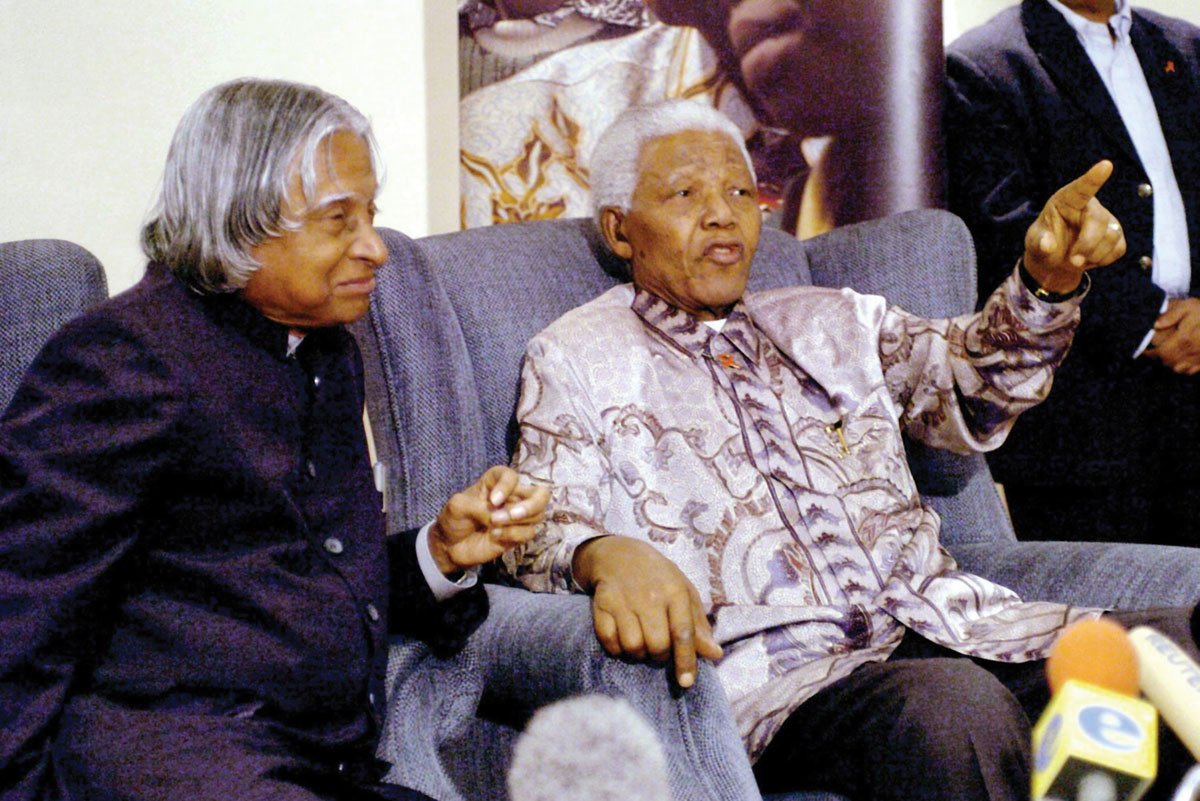KALAM
File photo of former President A.P.J. Abdul Kalam with Nelson Mandela in Johannesburg in September, 2004. (Press Trust of India)
Popularly called the “Missile Man” of India, Dr. A.P.J. Abdul Kalam rose from humble beginnings and earned the reputation of being the “People’s President” who endeared himself to all sections, especially the young. The country’s first bachelor President, Kalam, whose flowing grey hair is seen as being at odds with what Indians thought a President ought to look like, was one amongst the most respected people of the country who contributed immensely, both as a scientist and as a President. Moving from our traditional offering to mark India’s Independence Day celebrations, this month Siliconeer looks at the legacy Dr. A.P.J. Abdul Kalam left behind after his sudden demise last month.
From India’s Missile Man to People’s President
A son of a boat-owner, Avul Pakir Jainulabdeen Abdul Kalam, who assumed office as the 11th President of India, July 18, 2002, was seen as a figurehead who could help heal some of the scars of the communal riots which broke out in Gujarat just a few months before.
The country’s first bachelor President, Kalam, whose flowing grey hair is seen as being at odds with what Indians thought a president ought to look like, was one amongst the most respected people of the country who contributed immensely both as a scientist and as a president.
Acknowledged as the driving force behind India’s quest for cutting-edge defense technologies, Kalam’s contributions to India’s satellite programs, guided and ballistic missiles project, nuclear weapons program and the Light Combat Aircraft project was widely recognized throughout India.
Born and raised in Rameswaram in Tamil Nadu on October 15, 1931, Kalam, who is known for having a unique style, joined the Defence Research and Development Organisation (DRDO) after studying physics and aerospace engineering after graduating from Madras Institute of Technology.
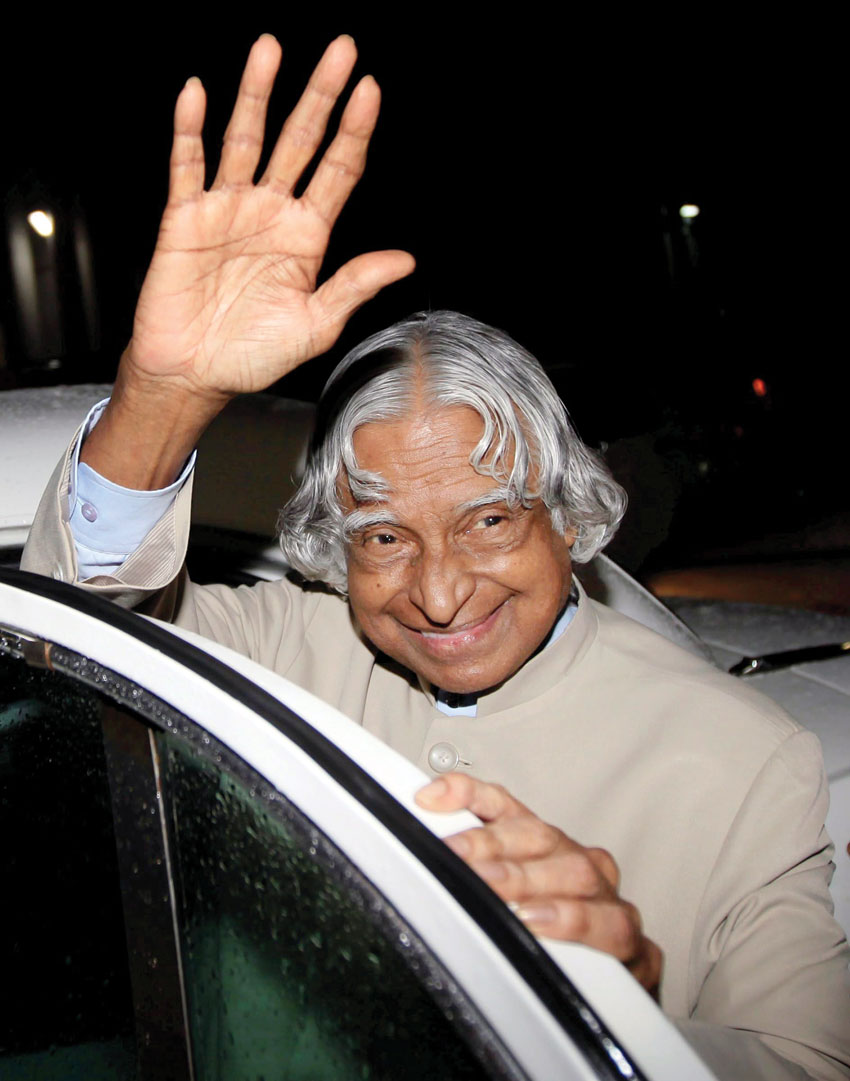
Mainly focusing on research in defense and space arena, he later involved himself in the India’s missile program. His contribution to the ballistic missile and launch vehicle technology earned him the title of “Missile Man of India.”
Kalam received several prestigious awards including Bharat Ratna, and played a crucial role when India tested its nuclear weapons at Pokhran in 1998 when the Vajpayee government was in power.
A vegetarian, Kalam was quoted as saying that like most of the technology he spearheaded, he himself was “Made in India,” having never been trained abroad.
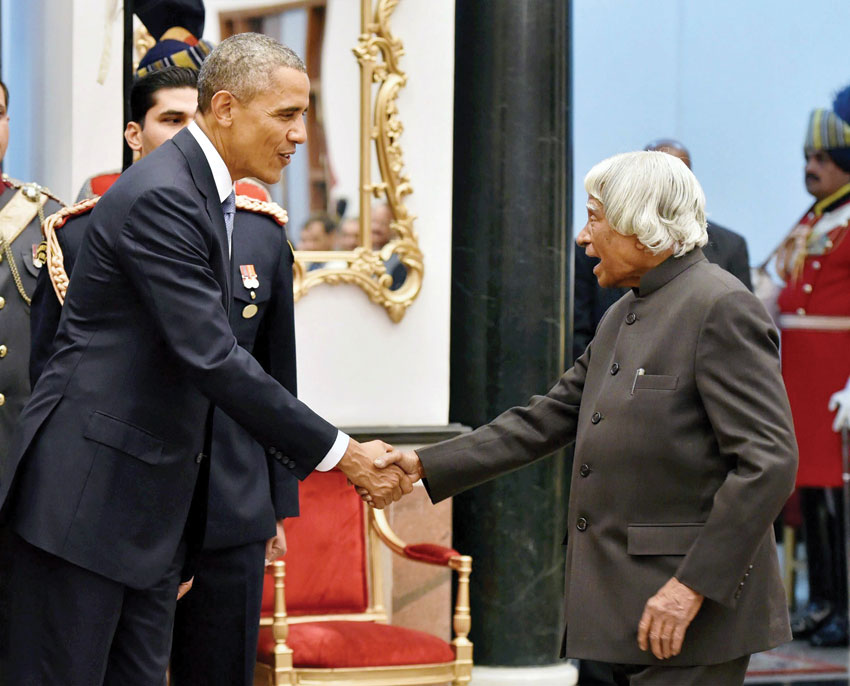
Kalam succeeded K.R. Narayanan and served a full five-year-term from 2002 until 2007 after he won the Presidential elections, which was a one-sided contest with Lakshmi Sahgal, a revolutionary of the Indian Independence movement, as his rival. He secured the backing of all political parties.
With his appointment, Kalam became the first scientist and first ever bachelor to occupy the Rashtrapati Bhawan.
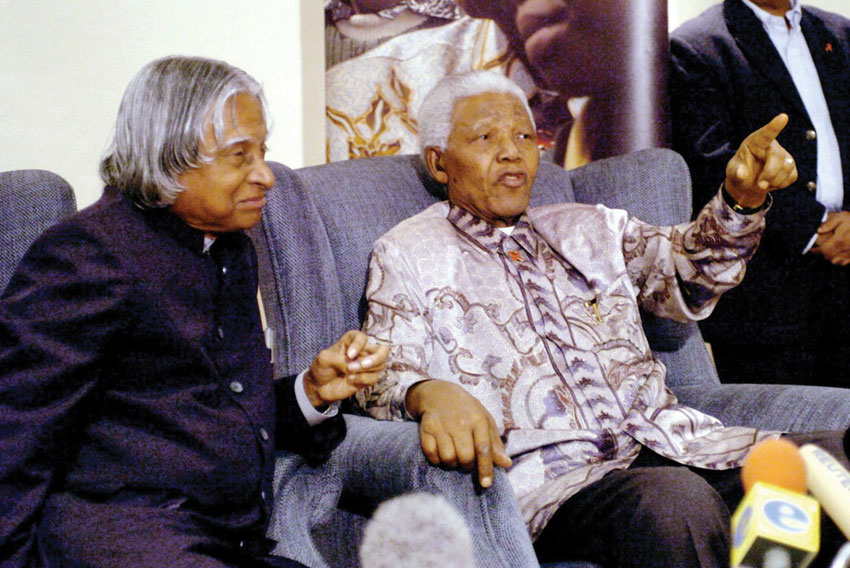
During his tenure as President, Kalam came up for criticism for his inaction in deciding the fate of 20 out of 21 mercy petitions.
Kalam also faced criticism over his assent from abroad to the controversial decision to impose President’s rule in Bihar in 2005. He, however, sought to dismiss the criticism, saying he has no regrets.
Kalam on one occasion showed that he too was not a rubber stamp-like Constitutional head by refusing to approve the Office-of-Profit Bill. It was an unexpected response that sent tremors across the political establishment, especially the ruling Congress and its leftist allies.
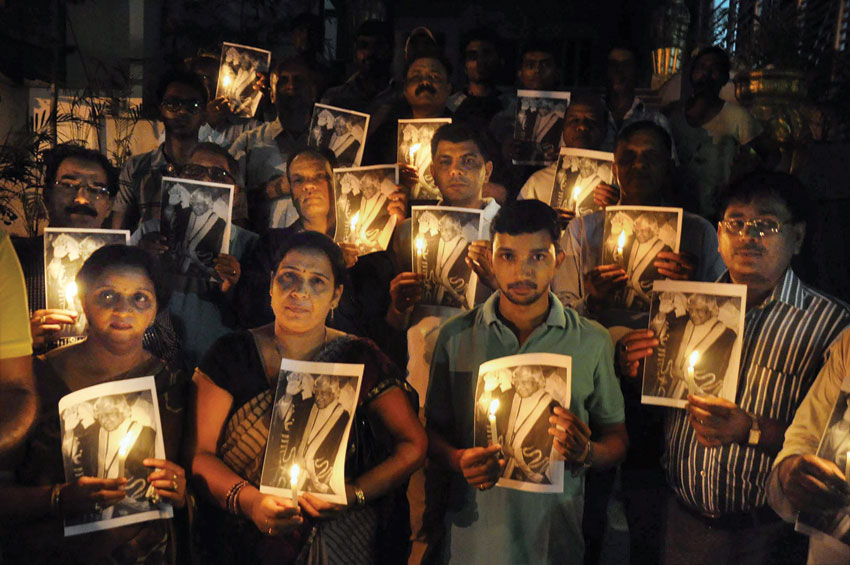
The next day, Prime Minister Manmohan Singh was left to explain the matter to the President and somehow get his consent for the Prevention of Disqualification (Amendment) Bill 2006.
Known for his unique interactive skills, Kalam made it a point to involve students in his speeches and lectures irrespective of their age group. After the lectures, he would often ask students to write to him and he did not fail to respond to many messages that he got.
For his contribution to the missile program, he was awarded with Bharat Ratna, the highest civilian award in 1997. He was also awarded Padma Bhushan in 1981 and Padma Vibhushan in 1990.
Post-presidency, Kalam worked as a visiting professor at Indian Institute of Management, Shillong, Ahmedabad and Indore and several research and academic institutions across the country, and the world. He authored several books with the ‘Wings of Fire,’ ‘India 2020’ and ‘Ignited Minds’ being the most read bestsellers.
Kalam’s father owned boats that he rented out to local fishermen, but he himself began his career as a newspaper vendor.
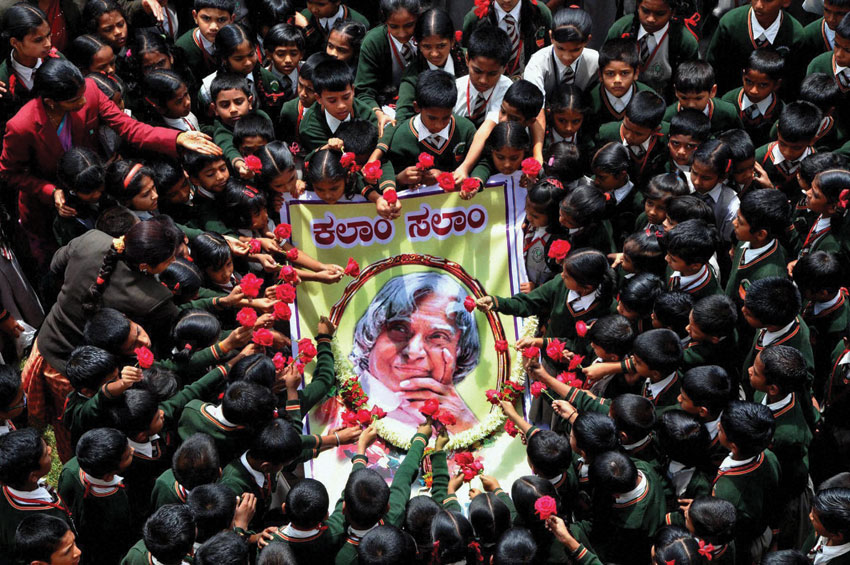
Don’t rest after victory, failure just an attempt at learning
“Don’t take rest after your first victory because if you fail in second, more lips are waiting to say that your first victory was just luck.” These were the words of late President A.P.J. Abdul Kalam, which he lived by, till the last moment.
83-year-old Kalam, who collapsed while delivering a lecture at IIM, Shillong, and died, was a daring President who undertook a submarine sortie, flew Sukhoi jet, visited Siachen glacier, world’s highest battlefield and interacted with troops at the Line of Control.
But probably none as daring as a night-time flight from Aizawl airport that took off after the runway was illuminated with lanterns and torches. This occurred one evening in 2005 when Kalam, always wearing a genial smile, had completed all his official engagements during his visit to Mizoram and was scheduled to leave the next morning. But a restless Kalam decided to take off for Delhi at night, one of his senior aides recalled.
The local IAF station’s head was summoned and informed of the President’s wish to fly to the national capital as his work in Mizoram was over.
“But there are no facilities for taking off from the airport at night,” the IAF official said, thinking the matter was settled.
However, his explanation did not cut ice with Kalam, who retorted: “What if there is an emergency? Will the IAF wait for the morning? Tell them I have to take off and all necessary arrangements should be made.”
His aides went to the IAF official and conveyed the message from Kalam, who as President was also the supreme commander of the armed forces.
The IAF commander immediately got in touch with his seniors in Delhi, who did not come to his rescue and instead asked him to comply with the orders of the “missile man.”
Finally, Kalam had his way and IAF personnel lit up the runway with lanterns, flaming torches and bonfires to facilitate the take off, the aide said.
“If you fail, never give up because F.A.I.L. means “first Attempt In Learning”; End is not the end, if fact E.N.D. means “Effort Never Dies”; If you get No as an answer, remember N.O. means “Next Opportunity”. So Let’s be positive,” was another quote that he often used to mention in his pep talks to university and school students.
Two years into his tenure, Kalam decided to visit troops in Saichen. In October 2004, he waited at the airport for weather clearance for 40 minutes before landing at Thoise airbase and later took a helicopter to reach army personnel at Siachen base camp.
“The glacier is of extreme geo-strategic importance where our Indira Col meets Pakistan-occupied Kashmir and Aksai Chin. Many battles have been fought during the last 20 years to establish our supremacy. It is war of deeds,” Kalam had said in his address to the troops.
An aeronautical engineer, Kalam also flew Sukhoi-30 fighter plane in June 2006 and, after the experience, said “it was a dream of mine since 1958, when I became an engineer, to fly in a fighter aircraft.” Kalam had taken controls of the fighter plane for three minutes during the 36-minute flight.
“I wanted to be a pilot since my childhood. Today, I was with my friend and teacher Wing Commander Ajay Rathore, who taught me successfully how to pilot the plane as well as [handle] warfare controls of the fighter,” he had said.
Earlier the same year, Kalam had created history in February by becoming the country’s first President to undertake an undersea journey in a submarine onboard INS Sindhurakshak, a Russian-origin kilo class submarine, from Vishakapatnam naval dockyard. “It was my first experience (to sail in a submarine underwater) and I learnt how the silent force of Indian Navy would function when it was underwater.
“Success comes if we work very hard in the midst of challenges. I experienced the challenges the submarine faces to make our country powerful,” Kalam had said.
When Kalam refused to sit on Presidential chair at an event
President A.P.J. Abdul Kalam refused to sit on a chair that was designated for him because the chair was larger in size than the other chairs!
This was one of the several instances where Dr. Kalam’s actions became synonymous with simplicity and humility that was the hallmark of his public life—both as India’s top scientist and most loved President.
At a convocation of IIT (BHU) Varanasi, Kalam was the chief guest and there were five chairs on the stage, the center one being for the President. The other four were designated for the top university officials.
Noticing his chair being bigger in size than the others, Kalam refused to sit on it and offered the Vice Chancellor to sit instead, according to a published account. The VC couldn’t, obviously and another chair was made available immediately for the “People’s President.”
Once, Kalam rejected the suggestion to put broken glass on the wall of a building that needed protection because it would be harmful for birds.
This happened when Kalam was with the Defence Research and Development Organisation (DRDO) and his team was discussing options to secure the perimeter of a building that needed protection. Kalam reportedly said: “If we do that, birds will not be able to perch on the wall.”
When youngsters and teenagers sought a meeting with him, Kalam, who always wore a genial smile, not only obliged and gave them his precious time, but he also listened carefully to the ideas the kids had. Soon after it was declared that Kalam would be the next President in 2002, he visited a school to deliver a speech. His security detail was minimal, and he didn’t mind taking control of the situation when the power went off.
Speaking to around 400 students, Kalam ensured the power cut didn’t cause any interruption. He walked right in the middle of the crowd and asked the students to surround him. He then spoke to them with his bare voice and delivered, like always, an inspiring keynote.
When a subordinate of Kalam at DRDO couldn’t take his children to an exhibition due to work pressure, he surprised his subordinate and took the children in stead, according to another published account.
The Presidential Guests, Kalam invited to Kerala’s Raj Bhavan
As the President, Kalam was entitled to invite anyone as the Presidential guests to the Raj Bhavan during his first visit to Trivandrum, now called Thiruvananthapuram.
Kalam had spent significant time as a scientist in Trivandrum and he invited his old friends, a roadside cobbler, who was close to Kalam during his scientist days in Kerala and the owner of a small hotel where he would often have his meals.
President Pranab Mukherjee, Vice-President Hamid Ansari, Prime Minister Narendra Modi, Home Minister Rajnath Singh and leaders cutting across party lines condoled the demise of the former President.
Modi described him as “marg darshak” (one who shows the path) while the Home Minister termed him as an inspiration to an entire generation. Leader of opposition in Rajya Sabha, Ghulam Nabi Azad, said that Kalam was a darling of youths and students.
Azad said Kalam was always happy to be among children and educational institutions. Even he breathed his last in the premises of an educational institution, he noted.
